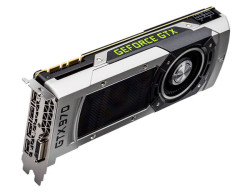Top Class Actions’s website and social media posts use affiliate links. If you make a purchase using such links, we may receive a commission, but it will not result in any additional charges to you. Please review our Affiliate Link Disclosure for more information.
Graphics processing un
Plaintiff Andrew Ostrowski claims in his Feb. 19 Nvidia class action lawsuit that the company misled its customers, who purchased the graphics or video cards which included GPUs made by Nvidia into thinking that the GTX 970 microchip “operates with a full 4GB of VRAM at GDDR5 (not a less performant 3.5 GB with a less performant and decoupled .5 GM spillover), 64 ROPs (as opposed to 56 ROPs) and an L2 cache capacity of 2048KB (as opposed to 1792 KB), or omitted material facts to the contrary.”
Nvidia makes the GPU microchip GTX 970 that Giga-Byte Technology uses in its GeForce graphics cards.
Ostrowski claims in his false advertising class action lawsuit that he bought two Gigabyte GeForce GTX 970 graphics cards, and he paid $370.00 for each one. He said that he purchased the cards to use for his college classes, which included video editing and game design.
The Michigan man says he purchased the graphics cards based on the specifications listed on Nvidia’s reviewer’s guide, and online retailers, which are the same specifications also stated on the product’s packaging.
Not long after purchasing and installing the GTX 970 graphics cards on his personal computer, Ostrowski “noticed that when using a high resolution monitor, the devices caused applications to slow, sputter, and cease working,” the Nvidia class action lawsuit states.
“He also noticed that video games requiring higher levels of performance would not work properly,” he added.
“Subsequently, Plaintiff learned that this was due to the material misrepresented or undisclosed fact that the alleged 4GB GDDR5 (Graphic Double Data Rate x 5 Memory) capability of the GPU, in actuality, only uses 3.5GB at the GDDR5 operating speed, while the remaining 500MB operates 80 percent slower, therefore not qualifying as actual GDDR5 memory capability device,” Ostrowski explains in his class action lawsuit.
“Moreover, the device had less ROPs and L2 cache than advertised, further lessening the capabilities, uses and benefits of the GTX 970,” he added.
Ostrowski says that he contacted Nvidia and Gigabyte about the problems he was having with the graphics cards and said that he wanted to return the items, but he “was told by both companies that there was no refund option.”
Newegg, the retailer from which he purchased the graphics cards from said that he could only return the graphics cards if they were damaged.
“Because Defendants refused to offer Plaintiff a full refund when he made such a request, Plaintiff now owns two GTX 970 devices that he must either sell at a loss or use for purposes other than that which he bought them for,” the class action lawsuit states.
“He thus has suffered a loss of money or property as a result of Defendants’ illegal business acts and practices,” it adds.
Ostrowski is looking to represent two nationwide classes in his Nvidia class action lawsuit — one for those who purchased a video card that included a GTX 970 GPU and one for those who purchased a graphics or video card made by Gigabyte that contains a GTX 970 GPU since September 2014.
He is charging Nvidia and Gigabyte of violating California’s business law for unfair business practices, deceptive business practice, unlawful business practices, and false advertising.
The plaintiff is represented by Alan M. Mansfield and Joe R. Whatley, Jr. of Whatley Kallas LLP and by Dennis G. Pantazis, Robert J. Camp, D.G. Patness of Wiggins Childs Pantazis Fisher Goldfarb, LLC.
The Nvidia False Advertising Class Action Lawsuit is Andrew Ostrowski v. Nvidia Corporation et al., Case No. 4:15-cv-00760-DMR of the U.S. District Court for the Northern District of California.
UPDATE: On July 25, 2016, Nvidia agreed to a preliminary settlement that will resolve claims in a group of proposed class action lawsuits that center around allegations that the company misled consumers about the performance and storage capabilities of its product. Nvidia says it will pay each buyer of the graphics card $30.
UPDATE 2: The Nvidia GTX 970 graphics card class action settlement is now open! Click here to file a claim!
ATTORNEY ADVERTISING
Top Class Actions is a Proud Member of the American Bar Association
LEGAL INFORMATION IS NOT LEGAL ADVICE
Top Class Actions Legal Statement
©2008 – 2024 Top Class Actions® LLC
Various Trademarks held by their respective owners
This website is not intended for viewing or usage by European Union citizens.















5 thoughts onNvidia, Giga-Byte Tech Hit With False Ad Class Action Over Graphics Cards
UPDATE 2: The Nvidia GTX 970 graphics card class action settlement is now open! Click here to file a claim!
This is good to know but where do we go to register as owners of a GTX970 to get the benefit of this? Today was the first time I heard of this.
UPDATE: On July 25, 2016, Nvidia agreed to a preliminary settlement that will resolve claims in a group of proposed class action lawsuits that center around allegations that the company misled consumers about the performance and storage capabilities of its product. Nvidia says it will pay each buyer of the graphics card $30.
I purchased one of these cards and am wondering how long this law suit could take and how to receive news on the status.
I’m glad Newegg.com is not being held liable in this case. They are a great company with excellent customer service. It’s not their fault NVIDIA is claiming over-stated merchandise. I hope they get what is coming to them. I don’t own this model, but have 5 other NVIDIA products.